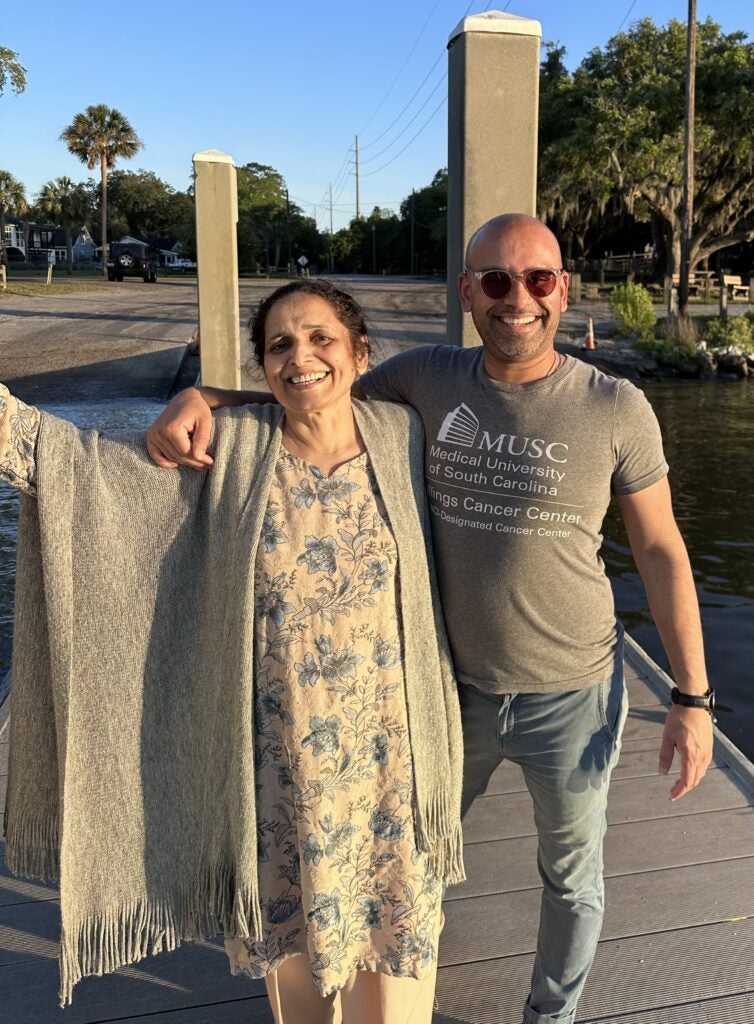In honor of Multiple Myeloma Awareness Month, we sat down with Dr. Hamza Hashmi, a hematologist-oncologist from Memorial Sloan Kettering Cancer Center, to understand how his family’s personal experience with cancer has influenced his approach to treating and caring for patients living with myeloma and other plasma cell disorders.
As an oncology specialist, Dr. Hashmi is accustomed to his friends and family turning to him for guidance or additional context when a loved one is diagnosed with cancer, as they seek ways to cope with the situation. His siblings are also physicians, and they often rely on one another for consults across their respective specialties. So, when he received a message from his brother with images of a patient’s labs in May 2023, he proceeded to provide his expertise as usual.
“I went through the case and immediately recognized the unmistakable signs of advanced-stage, high-risk myeloma. The indications were all there – high calcium, high protein, and poor kidney function,” said Dr. Hashmi. “But when I looked at the patient’s name, a realization hit me, it was Samia, our mother.”
This came as a big surprise as even the week prior, Samia seemed to be in perfect health, enjoying time with her children and grandchildren, and as an active member of her local yoga group. The shift in her health was sudden, and it continued to deteriorate quickly.

After her diagnosis, the siblings became deeply involved in her care decisions. Yet for Dr. Hashmi, each choice weighed heavily. Despite his expertise, his emotions threatened to cloud his judgment and he began to second-guess himself at every turn. Dr. Hashmi sought counsel from peers and mentors, ensuring that he continued to pursue the best possible care for his mother.
“Up until this moment, I had seen thousands of patients with myeloma, treating them with rounds of chemotherapy, transplants and novel, state-of-the-art therapies. But I’d never been in the role of making these decisions as a caregiver. Part of my role is to determine whether patients are well enough to go through the rigors of a transplant. Knowing my mother’s age and seeing her frailness, I had to make the very difficult decision that unfortunately, she was not fit for this. She may not even survive it.”
During Samia’s hospital stays, Dr. Hashmi gained a newfound respect for the various players who keep our healthcare system running: the nurses, physical therapists and support staff who selflessly contribute to all aspects of patient care. He also came to recognize the dedication and commitment often required of caregivers as they bring their loved ones home.
As his mother underwent chemotherapy, the same treatment he had provided to countless patients over the years, Dr. Hashmi came to understand the treatment’s impact on a patient’s quality of life like never before. The side effects plaguing his mom – weakness, fatigue, aches, and pains – became far more than just symptoms listed in a medical chart.
“I now saw these side effects through the lens of a caregiver, and the major impact they had on my mother’s quality of life. I realized there’s so much more that I wanted to do to help not only her, but all the patients I support.”
This journey has transformed Dr. Hashmi’s approach to patient care, balancing his previous aim to completely eradicate cancer with a more patient-centric approach that considers each individual patient’s quality of life. This experience informs his philosophy as he advocates for more personalized treatment plans and even the potential cessation of therapy as appropriate to improve his patients’ well-being.
For several years, Dr. Hashmi has used measurable (also known as minimal) residual disease (MRD) testing, specifically clonoSEQ®, with many patients in his practice. This tool helps to detect, quantify, and monitor MRD – the residual malignant cells that can be present at very low levels in a patient’s body after treatment, which are a strong predictor of outcomes. Results from the test can help physicians monitor subtle but important changes in disease burden over time, enabling personalized treatment decisions, including if their patient can safely de-escalate or discontinue therapy – which can be key to helping to restore a patient’s quality of life.
While Dr. Hashmi’s mother is not yet ready to go off treatment, he plans to use clonoSEQ once she is ready to consider next steps for her treatment, enabling his family to prioritize quality of life.
clonoSEQ® is available as an FDA-cleared in vitro diagnostic (IVD) test service provided by Adaptive Biotechnologies to detect measurable residual disease (MRD) in bone marrow from patients with multiple myeloma or B-cell acute lymphoblastic leukemia (B-ALL) and blood or bone marrow from patients with chronic lymphocytic leukemia (CLL). clonoSEQ is also available for use in other lymphoid cancers and specimen types as a CLIA-validated laboratory developed test (LDT). To review the FDA-cleared uses of clonoSEQ, visit clonoSEQ.com/technical-summary.